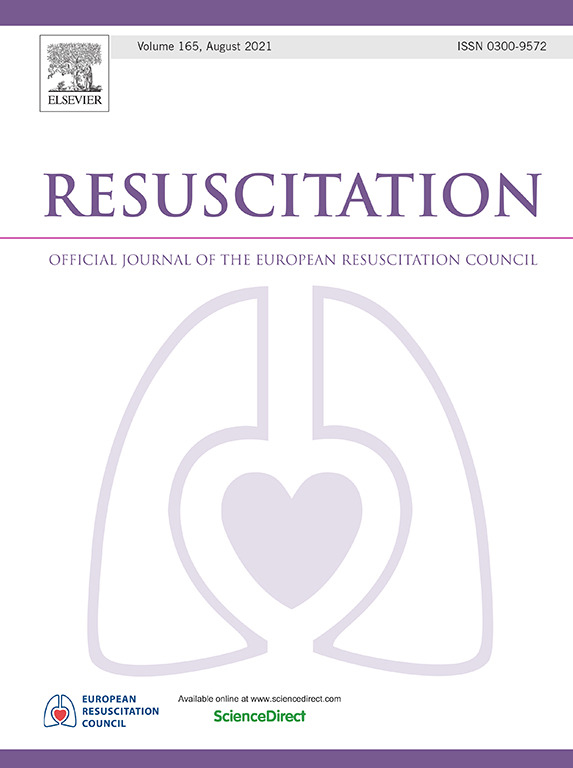COVID-19大流行期间,仅按压心肺复苏术与儿科院外心脏骤停的死亡率
IF 6.5
1区 医学
Q1 CRITICAL CARE MEDICINE
引用次数: 0
摘要
背景:COVID-19大流行影响了全球范围内的复苏实践,导致抢救呼吸心肺复苏(RB-CPR)显著下降,即使在儿科院外心脏骤停(OHCA)中也是如此。了解这种下降的影响对于评估抢救呼吸在儿科复苏中的作用是很重要的。本研究旨在评估COVID-19大流行期间减少RB-CPR对日本儿科OHCA患者死亡率和神经预后的影响。方法:本回顾性队列研究利用了2017年1月至2021年12月期间接受旁观者心肺复苏的全日本Utstein儿童OHCA患者(≤17岁)的全国数据。将2019冠状病毒病前(2017-2019年)和大流行期间(2020-2021年)的数据进行了比较。旁观者CPR分为RB-CPR和CO-CPR。主要结局是30天死亡率,次要结局包括没有恢复自发循环和不利的神经系统结局(脑功能分类评分为3-5)。校正风险比(aRR)和95%置信区间(CI)使用泊松回归估计。结果:在7162例儿童OHCA病例中,3352例(46.8%)接受了旁观者CPR。RB-CPR从大流行前的33.0%降至大流行期间的21.1%。CO-CPR与较高的30天死亡率相关(aRR: 1.16;95% CI: 1.08-1.24)和不良神经预后(aRR: 1.10;95% ci: 1.05-1.16)。这些趋势在各年龄组和骤停病因中都是一致的,特别是在非心脏原因中。更重要的是,据估计,在大流行期间,RB-CPR的减少导致每年多死亡10.7人。结论:本研究结果强调了抢救呼吸在小儿OHCA中的重要性。CO-CPR虽然适用于成人,但可能影响儿童的预后。在小儿复苏训练中重视抢救呼吸,整合感染控制措施,对今后的突发公共卫生事件至关重要。本文章由计算机程序翻译,如有差异,请以英文原文为准。
Compression only CPR and mortality in pediatric out-of-hospital cardiac arrest during COVID-19 pandemic
Background
The COVID-19 pandemic influenced resuscitation practices worldwide, leading to a notable decline in rescue breathing cardiopulmonary resuscitation (RB-CPR), even in pediatric out-of-hospital cardiac arrest (OHCA). Understanding the impact of this decline is important to assess the role of rescue breathing in pediatric resuscitation. This study aimed to evaluate the impact of the reduced RB-CPR during the COVID-19 pandemic on mortality and neurological outcomes among pediatric OHCA patients in Japan.
Methods
This retrospective cohort study utilized data from the nationwide All-Japan Utstein Registry for pediatric OHCA patients (≤17 years) who received bystander CPR between January 2017 and December 2021. Data were compared in pre-COVID-19 (2017–2019) versus pandemic (2020–2021) periods. Bystander CPR were classified as RB-CPR or chest compression-only CPR (CO-CPR). The primary outcome was 30-day mortality, with secondary outcomes including the absence of return of spontaneous circulation and unfavorable neurological outcomes (Cerebral Performance Category scores of 3–5). Adjusted risk ratios (aRR) with 95 % confidence intervals (CI) were estimated using Poisson regression.
Results
Of 7,162 pediatric OHCA cases, 3,352 (46.8 %) received bystander CPR. RB-CPR decreased from 33.0 % pre-pandemic to 21.1 % during the pandemic. CO-CPR was associated with higher 30-day mortality (aRR: 1.16; 95 % CI: 1.08–1.24) and unfavorable neurological outcomes (aRR: 1.10; 95 % CI: 1.05–1.16). These trends were consistent across age groups and arrest etiologies, particularly for non-cardiac causes. More significantly, the decrease in RB-CPR was estimated to contribute to 10.7 excess deaths annually during the pandemic.
Conclusions
The findings highlight the importance of rescue breathing in pediatric OHCA. CO-CPR, while suitable for adults, may compromise outcomes in children. Emphasizing rescue breathing in pediatric resuscitation training and integrating infection control measures is essential for future public health emergencies.
求助全文
通过发布文献求助,成功后即可免费获取论文全文。
去求助
来源期刊

Resuscitation
医学-急救医学
CiteScore
12.00
自引率
18.50%
发文量
556
审稿时长
21 days
期刊介绍:
Resuscitation is a monthly international and interdisciplinary medical journal. The papers published deal with the aetiology, pathophysiology and prevention of cardiac arrest, resuscitation training, clinical resuscitation, and experimental resuscitation research, although papers relating to animal studies will be published only if they are of exceptional interest and related directly to clinical cardiopulmonary resuscitation. Papers relating to trauma are published occasionally but the majority of these concern traumatic cardiac arrest.
 求助内容:
求助内容: 应助结果提醒方式:
应助结果提醒方式:


